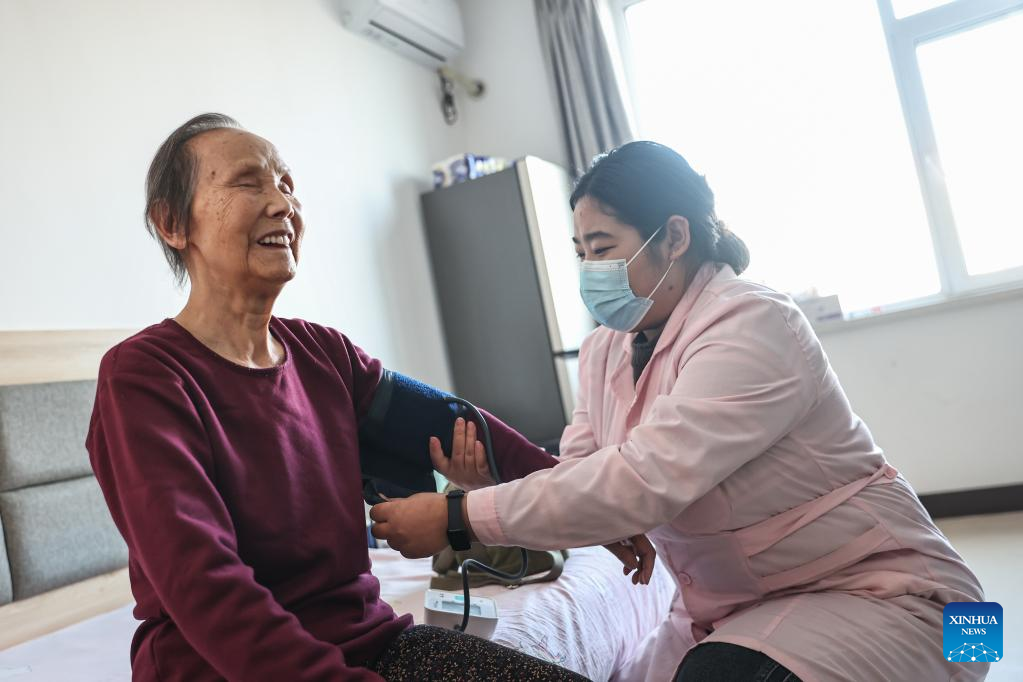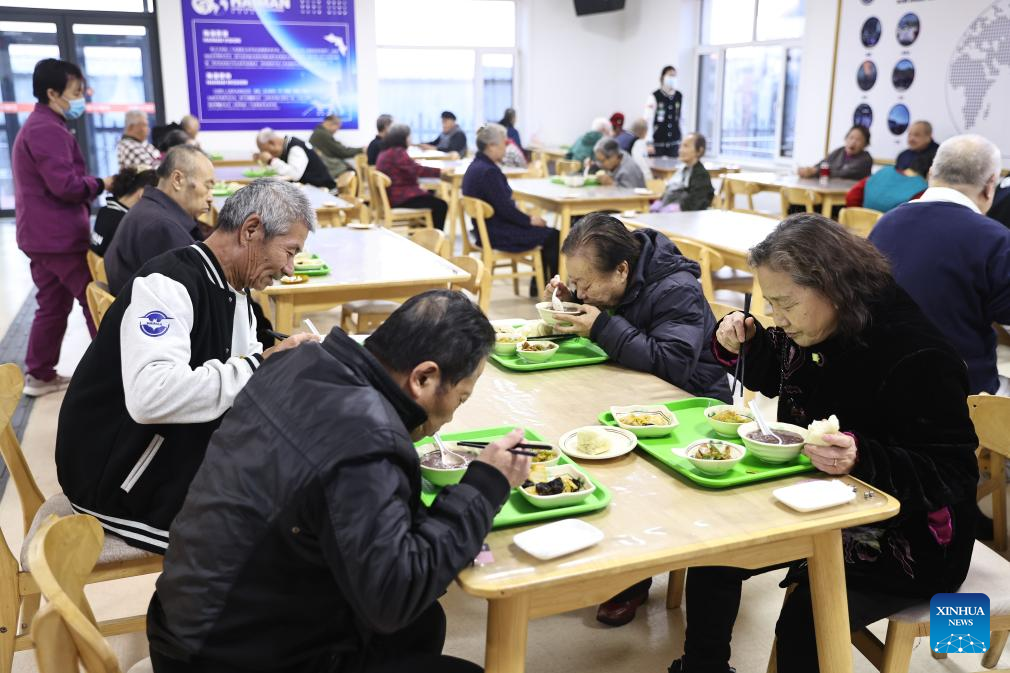Tuesday, April 1, 2025
Source: Xinhua
Editor: huaxia
2025-03-29 17:18:30

A medical worker measures blood pressure for an elder at Shenyang Haiman Specialist Care Retirement Home in Shenyang, northeast China's Liaoning Province, Jan. 7, 2025. (Xinhua/Pan Yulong)
SHENYANG, March 29 (Xinhua) -- As the radio echoed through the yard at lunchtime, a group of visually impaired elders navigated their way to the canteen, their hands gliding along the guardrails.
Chef Bai Yajuan used a microphone to read the dishes aloud. Six bowls of varying shapes and sizes, arranged in a set order, each containing a different dish, were served.
"Many blind people mix all their dishes into one bowl at home to avoid trouble and not burden their families," Bai explained. "To allow them to experience the flavors of each dish, we've designed bowls of different shapes to hold each dish separately, so they can easily get what they need."
On the canteen wall, there is a chart showing the dietary preferences of each elder, ensuring their individual needs are fully respected at this retirement home in Shenyang in northeast China's Liaoning Province. Besides, each table is labeled with the names of the elders in Braille, made from stainless steel, and placed at all four corners.
"Blind people prefer fixed seats so they can know who is sitting around them, which helps them feel more secure," said Zhang Yu, head of the Shenyang Haiman Specialist Care Retirement Home.
Established in 2019, the retirement home is the first dedicated facility for the blind on the Chinese mainland. It currently accommodates 107 visually impaired elders, 90 percent of whom are completely blind.
It was built with a donation from an entrepreneur whose sister is also blind. He hopes to help more blind individuals live comfortably in their old age.
"Guardrails with raised Braille are installed in all corners of the facility, allowing the elders to walk and exercise safely, both indoors and outdoors," Zhang said.
Zhang, who previously worked in human resources management, has an uncle who was also blind and witnessed the challenges faced by visually challenged people. When she learned about the retirement home for the blind in Shenyang, she didn't hesitate to send in her resume.
The retirement home currently has 22 employees, including nurses, housekeepers and counselors, many of whom have never worked with blind individuals before.
To better care for the elders, a special room has been created where staff members experience life in total darkness once a month, helping them understand the challenges faced by the blind. This exercise lasts for about two hours.
"One time, a staff member came out of this room and went to an elder's room. When she saw the elder struggling to open a delivery package, she was deeply moved and immediately began crying. Since then, she has been delivering packages to the rooms every day and, with the elders' permission, helping them unpack," Zhang said.
Zhang Li, 80, a resident of the retirement home, has not only found a home but also love here.
"I can sing and play cards with my friends every day, and there are people to take care of me. During the Spring Festival, my children wanted to take me home, but I didn't go. I don't want to go anywhere. Isn't this home?" said Zhang Li.
Here, she met Wang Mingshan from Shanghai. Despite a ten-year age gap, their shared hobbies, such as growing flowers and singing, as well as similar life experiences, have brought them closer.
Wei Yuying, 87, a native of Kunming in southwest China's Yunnan Province, has found more laughter since coming here.
"After my husband passed away, I was lonely at home, and it was difficult for me to go downstairs and get out every day. When I heard about this retirement home, I asked my children to bring me here," said Wei, who has lived here for almost five years.
To enrich the lives of the elderly, trips have been organized to various destinations, both home and abroad.
On the first floor of the retirement home, a world map made entirely of Braille dots adorns the wall, with red dots marking the places the elders have visited.
"Many people wonder, what is the point of blind people traveling? When they visit different places, they can breathe in new air, experience different customs, and taste different foods. Every time they return, they are in an especially good mood," Zhang Yu said.
The elders especially enjoy taking photos. "They can't see them themselves, but they can send the photos to their relatives and let them know that they're living a good life now, so there's no need to worry," she added.
According to the China Association of Persons with Visual Disabilities, there are currently over 17 million visually impaired people in China. With an aging society, the need for elderly care among blind individuals is becoming more pressing.
Last year, Haiman opened its second retirement home for the blind in Zhengzhou, central China's Henan Province. It plans to open at least five retirement homes for the visually impaired in China, covering the central, western, southern, eastern and northeastern parts of China.
China is vigorously promoting home-based care for elders who are unable to take care of themselves, including the blind.
In February, China began implementing a basic specification for home-based elderly care bed services, the first national industry standard for family elderly care. This includes senior-friendly facilities, smart equipment and home care services to ensure that the elders can enjoy continuous, stable and professional high-quality aged care services.
Statistics show that there are currently over 350,000 elderly care-related enterprises in China. Of these, more than 70,000 were registered in 2024. The number of registered elderly care enterprises has been steadily increasing year by year over the past decade, reaching its peak in 2024. ■

Elders have meals at a canteen of Shenyang Haiman Specialist Care Retirement Home in Shenyang, northeast China's Liaoning Province, Jan. 7, 2025. (Xinhua/Pan Yulong)

The names of the elders in Braille is seen on a dinning table at a canteen of Shenyang Haiman Specialist Care Retirement Home in Shenyang, northeast China's Liaoning Province, Jan. 7, 2025. (Xinhua/Pan Yulong)